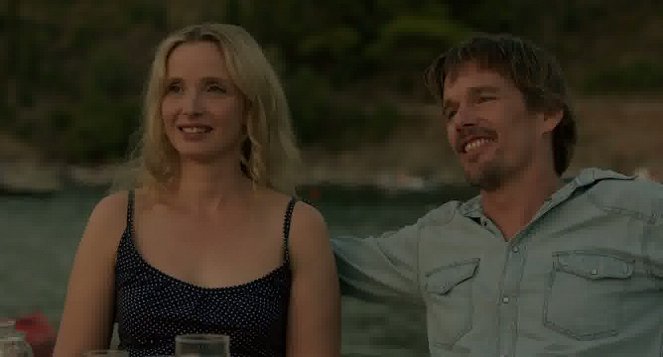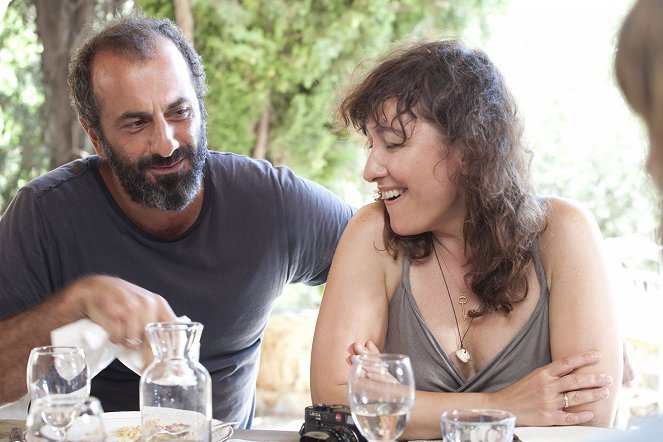Directed by:
Richard LinklaterCinematography:
Christos VoudourisComposer:
Graham ReynoldsCast:
Julie Delpy, Ethan Hawke, Athina Rachel Tsangari, Panos Koronis, Ariane Labed, Walter Lassally, John Sloss, Seamus Davey-Fitzpatrick, Xenia Kalogeropoulou (more)VOD (2)
Plots(1)
In Before Midnight, we meet Celine and Jesse 9 years on. Almost 2 decades have passed since that first meeting on a train bound for Vienna, and we now find them in their early 40's in Greece. Before the clock strikes midnight, we will again become part of their story. (official distributor synopsis)
Videos (4)
Reviews (10)
In my opinion the weakest installment in the entire trilogy. There’s no shortage of strong moments, and the chemistry between the two main protagonists still works, though it must be stressed that it is different from the previous installments. As I began with my criticism of Celine in my review of the previous installment, here I have to multiply it. There is no doubt that they are both in a very difficult life situation, which of course has a huge impact on how they function and "get along" with each other. I am not their age (at the time of writing I am a fresh-faced 29), but my life belief has always been and will always be that both partners should first and foremost help each other, support each other, and overcome obstacles together. I respect doubt, insecurity, searching – all those toxic feelings because I occasionally have them too (as does everyone). Personally, though, I have a problem with those doubts escalating into treating the other person in the couple like dirt. I dare not say whose side was at fault in this case. You can't anyway. But I see the starting point as finding a common solution and supporting each other, because that's how I think relationships should be. I'm certainly not selling a recipe for a happy relationship here, because I don't have one. It’s a hat trick, Mr. Linklater (wow the first time, bravo the second).
()
In the final part of the trilogy, Linklater and I really clicked. His characters have finally grown up and, despite their flaws, they are now able to behave as mature parents and partners. It is no longer so self-centered because their children, acquaintances, and friends complement the married couple. In terms of age, worries, and emotions, I feel close to them and I understand their problems and behavior. I would say that Linklater has matured as a filmmaker during the long breaks between films. Overall impression: 80%.
()
Life has consequences, that's just the way it is and we can't do much about it. We see this clearly in this amazing couple, whom we have met for the third time. Jesse and Céline are married, which is a pleasant realization, but gradually the romance that was associated with their first and even second meeting has disappeared from their shared life. They are used to each other, they have their problems. That's just life. Nevertheless, it's still enjoyable to watch and listen to the two of them because this is the most beautiful aspect in all three movies. Julie Delpy and Ethan Hawke simply fit together, whether they are in love or a little frustrated with life. They are such a perfect couple that one wonders why it's not the same in reality. Will we see a fourth installment in nine years?
()
Another incredibly mature work. Fantastically oscillating between melancholy, romance, drama, and exaggeration. Flawless acting and the several minutes-long shots, concentrating all the film energy on the two protagonists are a stroke of brilliance. A generational change within the theme, but the quality is absolutely unchanged. This is life.
()
Viaggio in Grecia. I got the same impression of superfluousness from The Godfather Part III, which at first glance was also made mainly for the purpose of reuniting old friends (real friends, not fictional). Everything essential was said before dusk and the rest belonged to reflections blurred by the spell of what was left unsaid. The third instalment abandons the concept of the previous two. The central couple is not under time pressure. They are not worried about the future, but they are haunted by the past to a greater extent than before. The dialogue is not between just the two of them, as other characters come into the picture, among whom all generations and at least three different worldviews are improbably represented. The attempt at a more complex definition of love in the 21st century (particularly the repeated allusions to modern communication technologies seem forced) disperses the attention that had previously been focused exclusively on the portrait of a single relationship over the course of time. The partners realise that the romantic situation (the hotel) was artificially created for them and they sarcastically comment on it, but they are still victims of film clichés (a previous partner is “destroyed” by alcoholism, the sexual act is interrupted by the ringing of a mobile telephone and if anyone is exposed not only in the figurative sense, it is only the woman). ___ Eric Rohmer had earlier fondly used dialogue as a crucial structural element, but he employed the mood of the surrounding environment to flesh out the characters. In Linklater’s previous two films, the space in which the dialogue took place could not be described as an extension of the characters’ inner world. Before Midnight offers a slight upgrade. It’s as if the summer-holiday mood of the chosen setting predetermined the less hurried tone of the film, and Greece, the land where tragedy was born – together with references to Medea and Rossellini’s Journey to Italy, culminating in the famous scene with the ancient statues – indicated a shift to more serious problems. Thanks to the partners’ sense of detachment and ability to engage in self-reflection, however, the film brings to mind the pleasant ease of previous encounters, despite the greater cynicism and cruelty in the emotional exposure, and the ancient tragedy fortunately does not happen (although fateful mistakes are made and the insurmountable differences between the genders bear some of its features). ___ It is apparent from the more bitter tone that both the director and the actors wanted to put the protagonists in a certain position and face them with certain problems that would push the tone of the “Before” sequence to the brink of total relationship de(con)struction along the lines of Who’s Afraid of Virginia Woolf? With respect to that, the element of chance that was a characteristic of the previous pair of films, which serious themes crept into quite casually, was weakened. The more ordinary framing detracted from the uniqueness of Celine and Jesse’s story. Though it’s true that the dialogue, again appropriately interspersed with meaningful silences, is still extraordinarily authentic and abounds with learned truths about life, the overall narrative structure is more carefully thought out and thus devoid of any hint of spontaneity. ___ Even though I didn’t find the film entirely believable, I would take the point of most of what it had to say. To hear the dialogue in an American film transition with such ease between comical, sentimental and cynical is a minor miracle (the naturalness of these “transitions” clearly shows that Delpy is a better actor than Hawke, who is more or less always thrown into the same casual position). Before Midnight is an invaluable treasure trove of useful advice for less experienced couples and bitter truths for those who have been around the relationship block before. As in the case of Before Sunrise and Before Sunset, anyone’s assessment of Before Midnight will be strongly influenced by their personal relationship experiences. I admit that if I give Before Midnight the lowest rating of all three films, that may be because I have not yet grown up enough to fully appreciate such a mature view of interpersonal relationships. Appendix: After some time had passed, I watched the film a second time and I have to admit that the “paradigm shift” from walking to walking away is radical enough to justify the slight change in style and the increase in the number of speaking characters. I particularly appreciate the naturalness with which we are prepared for the uncompromising solemnity at the end. It’s not merely the theme of conversations into which the fleetingness of time repeatedly creeps, but also, for example, the names of the characters (Ariadne, Achilles) referring to worlds that are ancient, vanished and yet still alive (not only in Greece). This dichotomy corresponds to the way Linklater and his two actors understand the coexistence of two beings. Despite their utterly sober view of relationship setbacks, with all their ephemerality, they do not completely renounce their romantic belief in eternal love. At least in this respect, Before Midnight is several decades ahead of most American romantic stories, which only falsely comfort us without a hint of scepticism. 80%
()
(less)
(more)



Ads